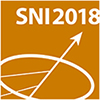Speaker
Description
Friction Surfacing (FS) is a solid-state process, which allows deposition welding at temperatures below the melting range. It can be used, e.g., for property enhancement or repair purposes. The technique uses a consumable stud that is rotated and pressed on a substrate surface while moved forward. The combination of materials used for stud and substrate defines the windows of process parameters: stud rotational and translational speeds and axial force. The rotational and translational stud speeds together with substrate geometry determine the temperature regime during deposition and the geometry of the coating. The focus of this investigation was the effect changing FS translational stud speed and substrate thickness have on the residual stress (RS) state of the AA2024 plates. Combined neutron and synchrotron diffraction analysis were used to determine the RS fields induced by the deposition process in both substrate and coating. The obtained results allow drawing conclusions on which FS parameters have most important effects on the RS state. Moreover, an estimative model of the RS formation during and after FS deposition can be developed.

